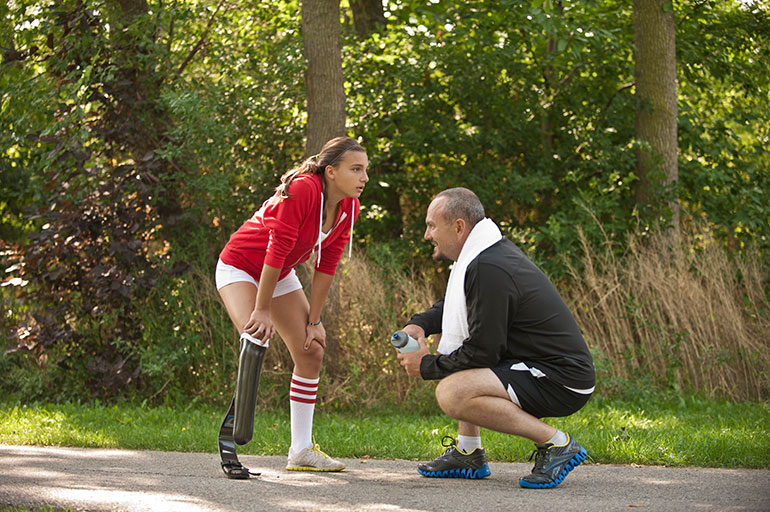
Experts have created an evidence-based tool that can help coaches be sure they are offering quality programs to parasport athletes. Photo credit: Canadian Paralympic Committee
Quality, not just quantity, important for building parasport programs
While blueprints are essential for any construction project, a team of researchers—working hand in hand with the Canadian Paralympic Committee (CPC)—say a clear blueprint is vital when it comes to establishing sporting programs including people with disabilities.
University of British Columbia researcher Kathleen Martin Ginis, along with a team of scientists from several universities and disability sport leaders from across North America, has been examining the quality of sport-related activities for people with disabilities.
The opportunity for someone with a disability to participate in an organized sport continues to grow each year in Canada, says Martin Ginis, who runs the Canadian Disability Participation Project (CDPP) from UBC’s Okanagan campus. However, she says, not all programs are created equal.
“While it is important to support sporting organizations in their quest to offer people with disabilities opportunities to participate in sport, it may also be time to start looking at the quality of these opportunities,” says Martin Ginis.
Research has proven that it’s vital for people with disabilities to be active, says fellow researcher Amy Latimer-Cheung, a Canada Research Chair in Physical Activity Promotion and Disability at Queen’s University.
“Sport is proven to promote physical activity among individuals with disabilities and has the potential to empower people, create a sense of community and redefine personal identities.”
To increase the likelihood of realizing these benefits, the quality of parasport is now being addressed.
“Quality experience should stand at the core of all sport,” explains Latimer-Cheung. “Participants should feel that they belong and have a choice. They should feel challenged, successful and focused. At the same time, they should find their activities meaningful.”
The research team suggests that positive experiences like these will help people stick with sport and achieve a range of personal and performance benefits. Further effects of more people active in sport also include a stronger system across Canada to develop more high-performance athletes.
Along these lines, the team has introduced an evidence-informed tool called the Blueprint for Building Quality Participation in Sport for Children, Youth, and Adults with a Disability that can help sport organizations determine if they are offering quality opportunities.
The blueprint uses up-to-date research to provide tools for building quality participation in sport programs specifically for people with a disability.
“Sport administrators, coaches and policy-makers who focus on sport for people with a disability must make quality of their programs a priority,” says Martin Ginis. “They now have an evidence-informed tool to help them in their quest.”
CPC’s CEO Karen O’Neill says the organization, alongside its sport partners, will look for the best ways to incorporate the blueprint to advance the quality of opportunities available for all para-athletes.
“This is important work and we applaud and support Kathleen Martin Ginis and the entire team of researchers for their efforts in improving parasport development,” O’Neill adds. “We know the incredible positive impact sport participation can have on the lives of people with disabilities. Offering quality experiences increases the chance of creating both lifelong and high-performance athletes, which ultimately supports the development of a strong and sustainable Paralympic sport system in Canada.”
The research introduces the Quality Parasport Participation Framework, which centres on six experiential elements that act as the ‘building blocks’ of quality parasport experiences. Under those building blocks, the team identified 25 conditions covering issues like physical environments, social environments, and activities that promote quality experiences. The ultimate goal is to provide the best experience for all involved.
“Our research, and the accompanying blueprint, emphasize that a multi-pronged approach is required to ensure a quality experience for all participants,” adds Martin Ginis.
This research, partially funded by the Social Sciences and Humanities Research Council of Canada and the Canadian Disability Participation Project, was recently published in the journal Psychology of Sport and Exercise.
About UBC's Okanagan campus
UBC’s Okanagan campus is an innovative hub for research and learning in the heart of British Columbia’s stunning Okanagan Valley. Ranked among the top 20 public universities in the world, UBC is home to bold thinking and discoveries that make a difference. Established in 2005, the Okanagan campus combines a globally recognized UBC education with a tight-knit and entrepreneurial community that welcomes students and faculty from around the world. For more visit ok.ubc.ca.
 'Fearless' dog survives fall
'Fearless' dog survives fall Green Party deputy jailed
Green Party deputy jailed Report into crash released
Report into crash released Facial recognition at border?
Facial recognition at border? PM ups attacks on Poilievre
PM ups attacks on Poilievre CRA will get the money: PM
CRA will get the money: PM Ukraine uses new missiles
Ukraine uses new missiles Biden signs war aid measure
Biden signs war aid measure New US rules for airlines
New US rules for airlines  BoC officials split on rate cut
BoC officials split on rate cut Big loss for Boeing
Big loss for Boeing  Metro sales edged higher
Metro sales edged higher Vees dominating Vipers
Vees dominating Vipers Warriors snakebitten in loss
Warriors snakebitten in loss Iginla off to Europe
Iginla off to Europe Coachella fined $28K
Coachella fined $28K Those are her nipples
Those are her nipples Kanye to launch porn studio
Kanye to launch porn studio




